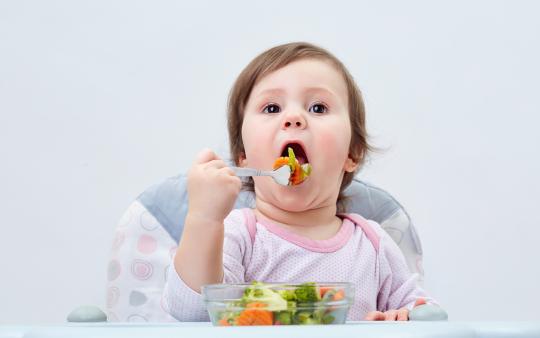Exclusive breastfeeding is recommended until six months of age by everyone from Health Canada, the Canadian Pediatric Society, the American Academy of Pediatrics to the WHO Global Strategy on Infant Feeding. At this point, if your baby is showing an interest in starting solid food, it is recommended the you begin to supplement breastmilk with other choices.
How do you know when your baby is ready for solids?
There are a few indicators to look for.
- Baby is capable of sitting up and holding their own head straight.
- Baby can open their mouth for a spoon.
- Baby keeps food in his or her mouth rather than pushing it back out again with their tongue.
How should you introduce new foods?
Offer small amounts of solid food at first—after nursing—and build up to full “meals” slowly. It’s a good idea to introduce new foods slowly (one new food every 3-4 days) and keep track of what baby tries, in case of allergic reactions. Don’t try to feed solids when he or she is not in the mood, it will only frustrate you both and food should be a pleasant experience! Experiment with making your own baby food, or take the leap into baby-led weaning! Enjoy yourself and let your baby explore this whole new world of edible adventures!
Discovering the world of solid food
Try new flavours!
This is such an exciting time for new parents! I loved watching my son discover new textures and flavours through foods. I found it fascinating that my infant daughter preferred her mashed potatoes with a sprinkle of curry powder mixed in. For both kids, flavour preferences would change over time but those first early months spent exploring the kitchen pantry were as thrilling for me as it must have been for them.
Solid food safety
I wanted to introduce solid foods safely. I kept meticulous notes on which foods we introduced and when in case an allergic reaction popped up, about reactions and any apparent likes or dislikes, gassy tummy troubles, or oddities at diaper changing time.
What type of foods should baby start with?
Consider starting with foods that are high in iron such as scrambled egg whites, lentils, poultry, fish, and iron fortified cereal (organic when possible). In your last trimester of pregnancy, baby began storing iron for the next 6 months in anticipation for the starting of solids. Iron is poorly transferred through breastmilk, so we want to ensure we are providing sources of iron to baby through food.
I had read somewhere that fruit should be introduced well after vegetables so as to avoid a sweet tooth—but I must admit I ignored the advice! I merrily mashed bananas, pureed apples, whizzed steamed squash in the blender, and allowed my babies to explore the brave new world of baby food.
In time, we tried scrambled eggs—which are an excellent choice as they are high in protein, fat, vitamins A, D, E and B12, folate, and choline, which plays an important role in brain development. Then we moved on to mashed tofu, shredded cheese, cubed ham, toast, and macaroni.
Try making Baby Banana Pancakes by slicing banana rounds dipped in pancake batter and cooked on the griddle. It was a huge hit with my kids and I still make it as a snack for them today!
Great first foods to consider at 6 months old include:
- Sweet potato, butternut squash, pumpkin, mashed
- Banana (watch for constipation)
- Avocado (watch for constipation)
- Mashed lentils
- Soaked apricots, pureed
- Bone broth (homemade, organic)
- Coconut oil
- Liver
- Peas
If you are concerned about food allergies, consider speaking with a holistic nutritionist or naturopathic doctor before you introduce solid foods, to gain a better understanding of what foods are best to start with, and how to monitor for food sensitivities and reactions.
*Originally published April 29, 2016









